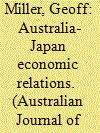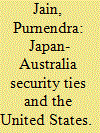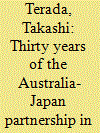| Srl | Item |
| 1 |
ID:
075056


|
|
|
|
|
| Publication |
2006.
|
| Summary/Abstract |
The NARA Treaty looked to a strengthened Australia-Japan relationship, which foreign ministers of both countries celebrated this year. Events of the mid 1980s, however, demonstrated how an adverse turn in economic circumstances can stress even a strong bilateral relationship. The two countries were then at opposite points in their economic cycles, Japan almost too successful, with the high yen putting pressure on Japan's export industries, steel in particular. Seeking to reduce costs, the steel mills transferred pressure to their Australian suppliers of coal and iron ore, through reductions in prices and volumes. This was unwelcome to an Australian government coping with a recession and worried about balance of payments and unemployment, and led to concerns about equal treatment. Although the minerals trade returned to normal relatively quickly, ambitious investment projects aimed at enhancing the economic relationship did not materialise.
|
|
|
|
|
|
|
|
|
|
|
|
|
|
|
|
| 2 |
ID:
075055


|
|
|
|
|
| Publication |
2006.
|
| Summary/Abstract |
The Basic Treaty of Friendship and Cooperation between Australia and Japan (the NARA Treaty) was the first treaty of friendship and amity signed between Australia and any other country. Importantly it extended most-favoured-nation status or non-discriminatory treatment beyond trade to all commercial dealings between Australia and Japan, including investment and migration and stay. It was a framework agreement that established a comprehensive basis of equality and fairness in economic and political relations. Yet it is frequently seen as not having had any substantial economic impact on the relationship. This article argues otherwise. It demonstrates that the NARA Treaty had a large and measurable effect on the intensity of investment flows and suggests that it had similar effects on the movement of people between the two economies.
|
|
|
|
|
|
|
|
|
|
|
|
|
|
|
|
| 3 |
ID:
075060


|
|
|
|
|
| Publication |
2006.
|
| Summary/Abstract |
This article offers an Australian perspective on future directions in Australia-Japan relations. An attempt is made to identify issues that will have a bearing on the bilateral relationship over the next five years and beyond at the national level. There is not any likelihood of a substantial rupture or change in relations in the short-term. The continuation of a stable, close and dynamic relationship in the mid to long-term, however, will depend on how both countries conduct their respective foreign policies towards China.
|
|
|
|
|
|
|
|
|
|
|
|
|
|
|
|
| 4 |
ID:
075057


|
|
|
|
|
| Publication |
2006.
|
| Summary/Abstract |
This article considers recent developments in Australia-Japan security and defence ties and their trilateral dimension with the United States. I argue that the security links bilaterally and through their main ally the US have scope for development while the three nations share perceptions of security and strategic matters. However, there are elements of inherent unpredictability that may come into play to hinder the move towards a further strengthening of the current trilateral security arrangement. Possible impediments come from both external and internal sources making it difficult for the three nations to transform their trilateral security relations into an institution, alliance or treaty that formally links the three partners strategically.
|
|
|
|
|
|
|
|
|
|
|
|
|
|
|
|
| 5 |
ID:
075058


|
|
|
|
|
| Publication |
2006.
|
| Summary/Abstract |
This article reviews the development of the Australia-Japan partnership in building regional institutions such as the Pacific Economic Cooperation Council and the Asia-Pacific Economic Cooperation over the last three decades since the NARA Treaty was signed in 1976. In a unique partnership, academics, business people, politicians and officials in both countries were central to establishing these regional economic institutions. This article, however, argues that while both countries had shared understandings on regional issues during the first two decades after the treaty, the last decade has seen divergent regional understandings, especially over the rise of China. Japan sees the growing influence of China as a political obstacle due to growing bilateral tensions arising from historical and territorial issues, while Australia finds it a great economic opportunity to promote its trade with and attract investments from China. This differing understanding on China between both countries may act as a major hurdle to the effective and functional partnership in East Asian regionalism.
|
|
|
|
|
|
|
|
|
|
|
|
|
|
|
|
| 6 |
ID:
075059


|
|
|
|
|
| Publication |
2006.
|
| Summary/Abstract |
With 2006 and 2007 marking two important anniversaries in the history of their bilateral ties, Australia and Japan are committed to reaffirming the significance of their relationship and expanding it into new dimensions. The Australian and Japanese foreign ministers have agreed to build a 'comprehensive strategic partnership' between their two countries. What are the factors that motivate Canberra and Tokyo to elevate their bilateral relations to the level of a strategic partnership? From a Japanese point of view, the main reason is the enhanced strategic importance of Australia with such indicators as Australian's enhanced security role, the structural changes in Asia and movements toward a new regional architecture, Japan's energy and food security, the trilateral strategic dialogue between Australia, the United States and Japan, and shared values and the Australian government's policy toward Japan. Both nations are expected to advance toward an even closer relationship with these factors in mind.
|
|
|
|
|
|
|
|
|
|
|
|
|
|
|
|